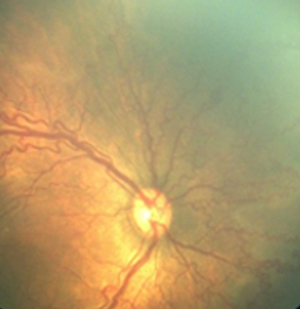
Retinopathy of Prematurity (ROP)
Retinopathy of Prematurity (ROP) is a potentially blinding eye disorder that affects premature infants. It occurs when abnormal blood vessels grow and spread across the retina — the light-sensitive layer at the back of the eye — which can lead to retinal detachment if untreated.
Under the expert care of Dr. Uday Tekchandani, ROP screening and treatment are performed with precision and compassion, ensuring early diagnosis and timely intervention for optimal visual outcomes.
Signs & Symptoms of ROP
ROP typically does not show obvious symptoms in infants. Hence, regular screening is crucial for premature or low-birth-weight babies. In advanced stages, parents may notice:
- Abnormal eye movements or wandering eyes
- White or dull pupil (leukocoria)
- Crossed eyes (strabismus)
- Poor visual tracking or delayed visual development
Causes and Risk Factors
ROP develops because of abnormal growth of retinal blood vessels after birth. The main risk factors include:
- Premature birth (especially before 34 weeks of gestation)
- Low birth weight (below 2000 grams)
- Prolonged oxygen therapy or mechanical ventilation
- Infections or respiratory distress in newborns
- Unstable blood oxygen levels in the NICU
Treatment for Retinopathy of Prematurity
Timely screening and treatment are vital for preventing vision loss. Based on the stage and severity of ROP, Dr. Tekchandani provides the following treatments:
- Laser Photocoagulation: A precise laser is used to seal abnormal retinal blood vessels, preventing further damage.
- Intravitreal Anti-VEGF Injections: Medications injected into the eye (under local anaesthesia) to halt abnormal vessel growth.
- ROP Surgery (Stage 4 & 5): Advanced cases are managed with vitreoretinal surgery to reattach the retina and restore vision.
Key Advantage: Procedures are performed using No Stitch, No Patch, No Injection micro-incision techniques whenever suitable — ensuring safety, minimal discomfort, and quicker recovery for infants.
Prevention & Early Screening
ROP cannot always be prevented, but early screening and proper NICU care can significantly reduce its severity:
- All premature infants (< 34 weeks or < 2000 grams) must undergo their first eye screening at 3–4 weeks after birth.
- Maintain strict oxygen regulation in NICU under expert monitoring.
- Ensure periodic follow-ups for infants at risk until retinal vessels fully mature.
- Encourage awareness among NICU staff and parents for timely ophthalmic referral.
Why Choose Dr. Uday Tekchandani for ROP Care
- Specialized fellowship training in Retinopathy of Prematurity management from PGIMER, Chandigarh.
- Extensive experience in laser, intravitreal, and surgical management of advanced ROP (Stage 4 & 5).
- Use of cutting-edge retinal imaging and wide-field screening devices suitable for premature infants.
- Dedicated collaboration with leading NICUs across Mumbai for comprehensive neonatal eye care.
- Patient-centred approach with ongoing parental counselling and follow-up support for sustained visual development.
- He Has multiple publications and awards on national and international level for his work of Retinopathy of Prematurity.
